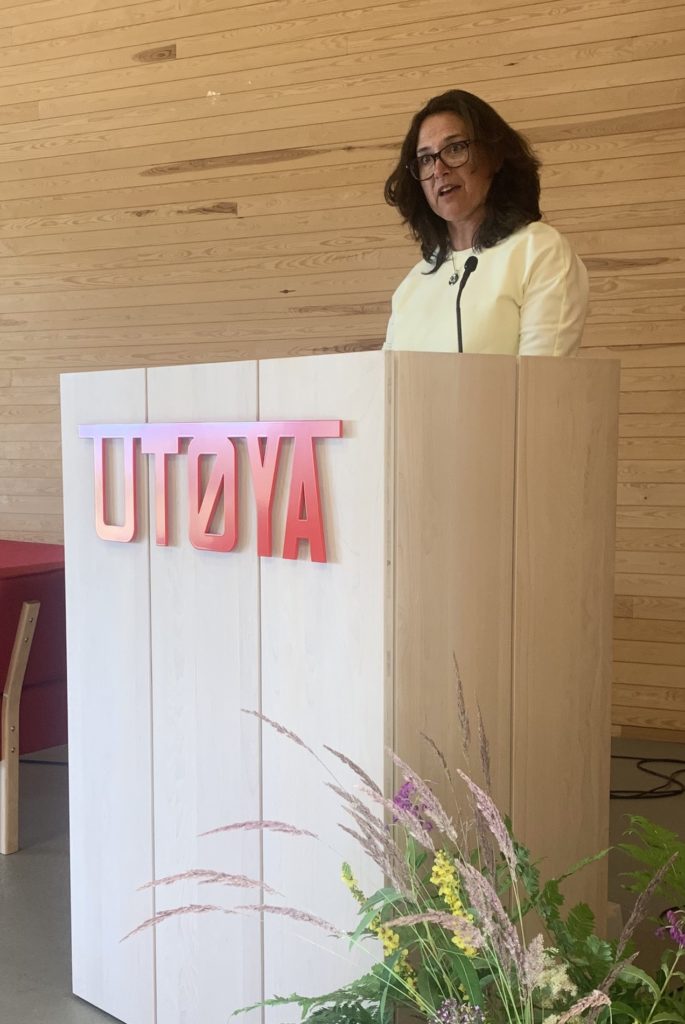Speech given by EWC Executive Director, Ana Perona-Fjeldstad, at the seminar held at Utøya 19-20 July, marking 10 years since the terror attacks 22 July 2011. The event is organized by EWC together with Utøya.
Dear supporters, partners and colleagues,
I want to start today by giving voice to the students that have participated at Learning Democracy here at Utøya, and engaged their fellow students, teachers, and parents when they returned home:
«The most significant change is probably my own thoughts and understanding, but also the opportunity for me to make a difference”
«My eyes have been opened for what democracy means. What it is, and what it means for me as a young person in society. I have learned that democracy is not just something “boring” adults sit and discuss in the Parliament. It is so much more”

About seven years ago, the conversation between Utøya and EWC regarding the development of a learning project at Utøya started. EWC´s mandate is given by the Council of Europe and Norway. We shall provide training for democracy, human rights and intercultural understanding. Is there a more important place than Utøya to contribute to this?
Right from the start, we experienced the reluctance to deal with issues related to 22 July and Utøya up close. EWC received many well-intentioned advice to not go ahead with this project. It would just be too difficult, too political, too controversial. This was also highly present within the Norwegian authorities and administrative system. Utøya was perceived as too painful, too close, too political. Nevertheless, we saw the immense potential in Utøya as a place of learning.
10 years have passed since the terror attacks 22 July 2011. Unfortunately, we see that extreme ideas take more space, especially online. Right-wing extremist conspiracies and values of exclusion are promoted and disseminated just as easily whether you are in Tromsø, Hamburg or Paris. The UN Secretary General stated in February that the corona pandemic had amplified this trend and stressed that the prevention of right-wing extremism should be put on the political agenda across the globe.
Education International is concerned about the political pressure experienced by teachers in many countries. In Germany and the Netherlands parties on the far right have created online platforms where students can report on what is called “leftist indoctrination in schools”.
Generally, it is difficult for teachers to handle the expectation of discovering and handling students that express extreme views – often in the form of widespread conspiracy theories-, while at the same time ensuring good and trusting student-teacher relations, which is crucial for learning.
The role of education in the prevention of extremism is complex, and a job for society as a whole, not the school alone. In policies and action plans on prevention of extremism the role of the school needs to be clear. This is not always the case, nor it is in Norway.
Furthermore, we must emphasize that education and knowledge in itself does not prevent extremism. For example, several of the top leaders under Hitler in Germany and Stalin in Soviet were highly educated. That did not stop them from committing atrocities and human rights violations. The role of education in the prevention of extremism must therefore be about the content. In other words, an education that fosters a deep understanding of and critical thinking around democratic values and principles, that is understood and experienced rationally and emotionally, with transfer value to your own life.
Here, we see a challenge related to Utøya as a place for learning, but also to teaching about the terror attacks 22 July. Most people will easily be able to take a stand against the incitements to violence and the actual attacks. Therefore, it can be difficult to see the link between the underlying motive of the attacks, and the importance of one´s own role as an active citizen. To create a link between learning and students’ own lives is a fundamental principle when educating for democracy. In this context it involves a broad approach, starting where an extreme mindset can grow, i.e. with attitudes of exclusion, a black-white world view of certain groups in society and a tendency to accept violence as a means to achieve their goals. The opposite of such a worldview is in many ways democratic participation, critical thinking, peaceful conflict resolution and dealing with disagreement. This may be the school’s most important contribution.
As we mark 10 years after 22 July, there is a need for more knowledge on the development of extremist views. It is important that this knowledge comes from research, but also from experience and practice. How does educational policy, curriculum and teaching resources affect the practice at schools? What are the challenges and needs of students and teachers? Students, teachers, principals, and others working closely with the schools must be heard in this process.
Five years ago, we organized the first seminar at Utøya with 15 students and teachers from Oslo and Bergen. Hegnhuset was not yet open, only the foundation was in place. Today, five years later, it is in daily use and the learning programme reaches hundreds of students across the country every year. It is inspiring to see what happens at the schools after they return, to see students engage with their fellow students – as well as with teachers and parents – talking about 22 July, discussing democratic questions and dilemmas, and developing confidence that they can participate in democracy.
Fundamental to education for democracy and human rights is to encourage and facilitate for young people’s belief in their own political ability – to have the confidence that you have what it takes to contribute to create change, and the belief – and trust in – the system to be receptible to change. What we want is for young people to stand for something, not just against something.